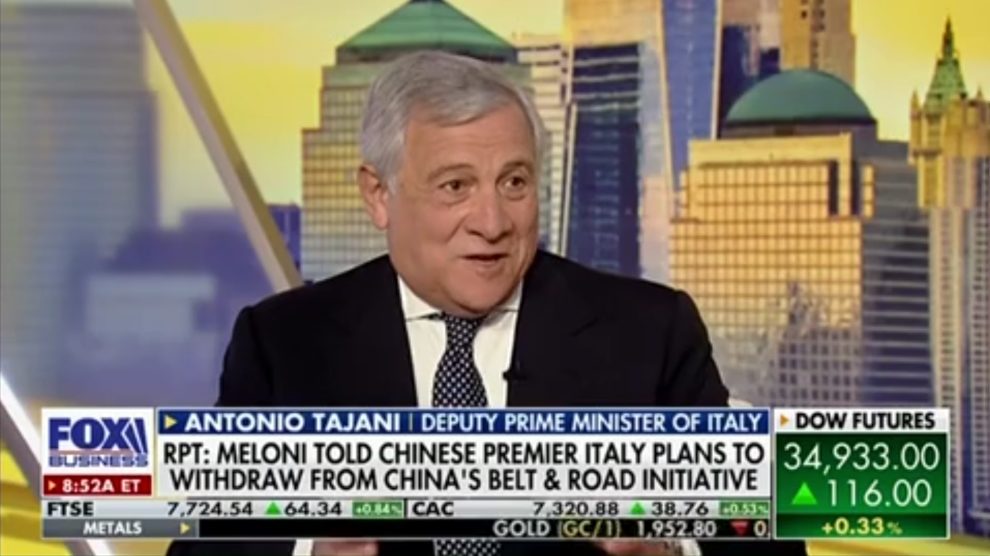Italy is dropping out of the BRI. The long-awaited decision was discussed on Wednesday by Antonio Tajani. Speaking to Maria Bartiromo on Fox News, the Italian Foreign Minister (and Deputy Prime Minister) said that Prime Minister Giorgia Meloni has “spoken with China” about Italy’s plans to exit the Belt and Road Initiative, he added.
- Rome entered the BRI when the Conte government signed a Memorandum of Understanding in March 2019 – the only G-7 capital to do so.
- That deal lasts for five years and is set to auto-renew (in March 2024) unless one of the two parties actively withdraws from it, three months before (December 2023) at the latest.
A long time in the making. PM Meloni had always maintained that entering the BRI had been “a big mistake,” reiterating that point shortly before the elections that brought her into power (“If I had to sign the renewal of that memorandum tomorrow morning, I would hardly see the political conditions [to do so],” she said back then). Ever since the elections, she had been more cautious on the issue – but several ministers and governing MPs had signalled that Rome was leaning towards a rethink.
- Italian politicians have been pointing to data from the Ministry of Foreign Affairs showing that the BRI membership did not significantly boost Italy’s trade relation with China.
- Further confirmation came from Bloomberg reporting that PM Meloni had confirmed Italy’s exit to United States House Speaker Kevin McCarthy when he visited Rome.
It’s delicate. FM Tajani then travelled to Beijing in early September with the delicate task of preparing the ground for this decision and minimising the backlash from the Chinese side. Asked by Ms Bartiromo whether Beijing would retaliate, FM Tajani answered: “I don’t know […], but we are friends of America, of the West,” he said, reiterating that Italy wants to “talk” with China – which nonetheless remains a “counterpart.”
- In other words, exiting the BRI also consolidates Rome’s political repositioning vis-a-vis China, initiated under the Draghi government and continued by PM Meloni.
- As Enterprise Minister Adolfo Urso said on Tuesday, the BRI deal was “envisaged as a strategic alliance” when it was signed – and Rome now believes that this relationship “must be returned to its original channels as a traders’ route, reducing political risks and increasing trade opportunities.”
Word for word. Speaking with the press after the Fox News interview, FM Tajani sought to clarify his position on the BRI. “We have also put the problem to the Chinese, and we have not found economic advantages in being part of this initiative,” he said, remarking that comparable powers France and Germany “have achieved better results without joining it.”
- During the interview, he added, “I argued that the [BRI] is a chapter in the strategic partnership we have with China and that we will continue to collaborate on the understanding that we are in the West: Beijing is our interlocutor, and sometimes even a competitor.”
- He then emphasised that he had not made “any announcement: we are evaluating what to do, the economic assessments are not positive, and we will tell China what our decision will be.”
What now? It’s unclear when the decision will become official. First off, it’s unlikely to happen right before or around the October conference where Xi Jinping and other leaders (including Russian President Vladimir Putin) will celebrate the BRI’s tenth anniversary. That would be part of the strategy to avoid embarrassing Beijing, with whom Rome still has a strategic partnership.
- Furthermore, as PM Meloni said right before FM Tajani travelled to Beijing, the BRI choices “will have to be pondered and discussed in Parliament.”
- FM Tajani believes the majority of MPs are in favour of withdrawing, as he told Ms Bartiromo. Later he remarked on the importance of walking a parliamentary path “when talking about such important agreements.”
- A parliamentary confirmation would validate the decision and possibly help avoid Chinese animosity by relegating the issue to the trade commissions. After all, boosting exports was the chief reason offered by the Conte government for signing the 2019 MoU.
This piece was updated to add FM Tajani’s clarifications after the Fox News interview.
Image: screenshot from Fox News’ Mornings with Maria




